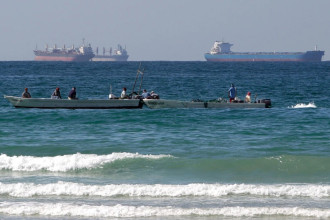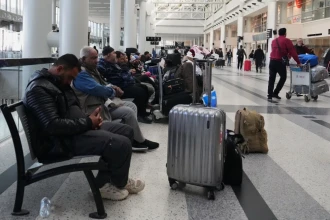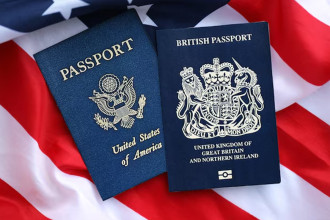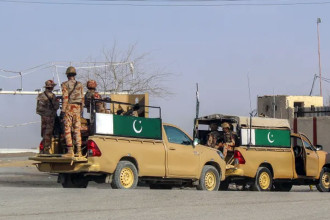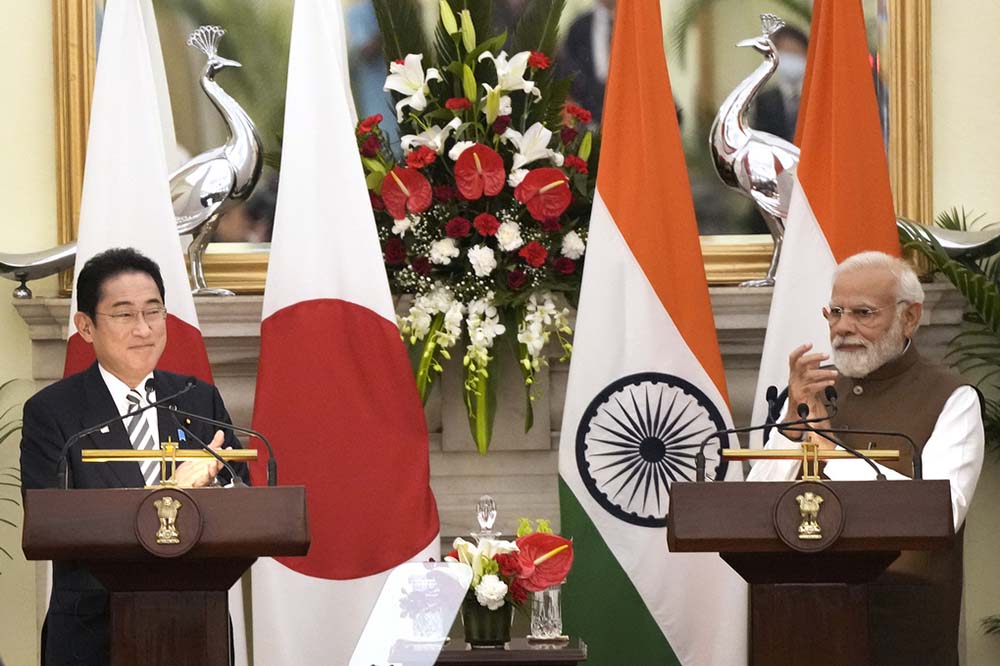
NEW DELHI: Japan's Prime Minister Fumio Kishida on Monday invited his Indian counterpart Narendra Modi to the Group of Seven summit in May and announced action plans for a new Indo-Pacific initiative aimed at countering China's influence in the region.
Kishida, who is on a two-day trip to India, said he hopes to promote a vision of free and open Indo-Pacific, a Tokyo-led initiative for greater security and economic cooperation that is geared toward curbing Beijing's growing assertiveness. It includes Japan's assistance to emerging economies, support for maritime security, a provision of coast guard patrol boats and equipment and other infrastructure cooperation.
It fits with Japan's new national security strategy adopted in December under which Tokyo Japan is deploying long-range cruise missiles to strengthen its strike-back capability, and using development aid more strategically in support of like-minded countries.
India, which is heading this year's Group of 20 industrial and emerging-market nations, says ties with Japan are key to stability in the region. The two nations, along with the United States and Australia, make up the Indo-Pacific alliance known as the Quad.
China's territorial claims in the East China and South China seas have rattled Beijing's smaller neighbours in Southeast Asia as well as Japan, which is also facing threats from North Korea's nuclear and missile development. The relationship between New Delhi and Beijing also has deteriorated since 2020, when Indian and Chinese troops clashed along their undefined border in the Himalayan Ladakh region, leaving 20 Indian and four Chinese soldiers dead.
[caption id="attachment_34451" align="alignnone" width="1000"]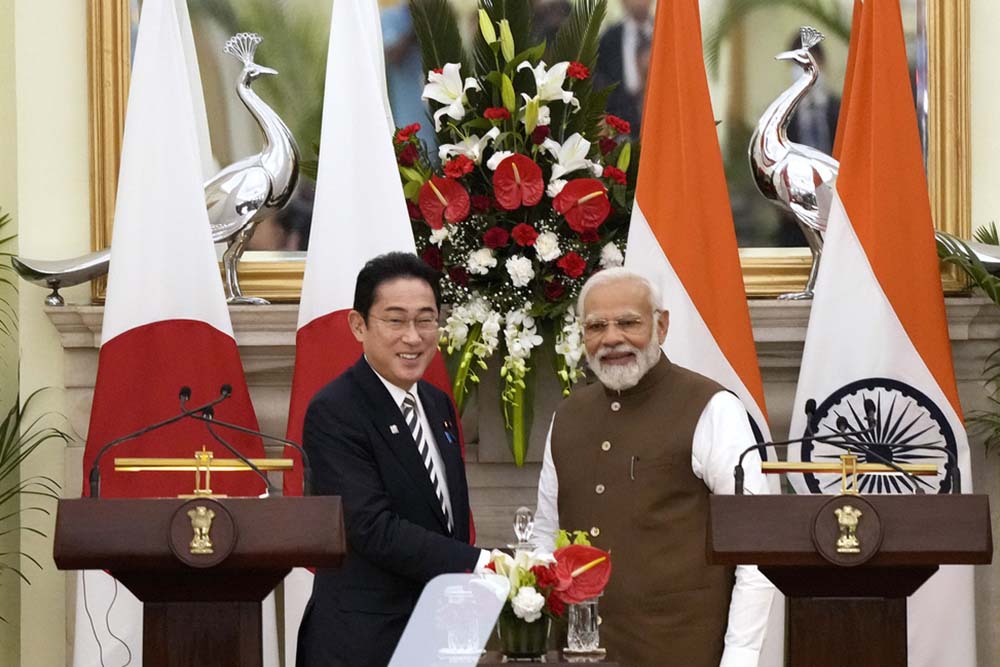 Japan’s Prime Minister Fumio Kishida, left and Indian Prime Minister Narendra Modi, shake hands after making press statements following their meeting in New Delhi, India, on Monday, March 20, 2023. Photo: AP via RSS[/caption]
Kishida also held talks with Modi to deepen bilateral cooperation while also addressing food security and development financing. The two leaders said they will closely cooperate in dealing with a wide range of global challenges, including soaring prices of energy and food supplies that have exacerbated since Russia's war in Ukraine.
Kishida said Modi accepted his invitation to participate in the G-7 summit of major industrial nations, which will be held in Hiroshima in May. He told reporters later that he will also invite seven other heads of non-G-7 countries, including South Korean President Yoon Suk Yeol — a step toward further improving Japan-South Korea ties and bringing Seoul closer to other key players in the strategic map of the region.
In his statement, Kishida said he told Modi that he hopes to take up challenges at the summit including upholding the rules-based international order and strengthening partnership with the international community that goes beyond G-7 and includes the Global South, a term used for developing nations in Asia, Africa and Latin America.
The two leaders also discussed their priorities for their respective presidencies of the G-7 and G-20, Modi said in a speech.
Japan holds the G-7 presidency in 2023 and has sought deeper ties with developing countries to lay the groundwork for a successful summit.
In an article for the Indian Express newspaper Monday, Kishida said "the foundation of order in the international community was shaken by Russia's aggression against Ukraine" and its impact on food access and fertilizer prices were felt everywhere, including in the Indo-Pacific region.
"In order to respond effectively to the various challenges that the international community is currently facing, cooperation between the G-7 and the G-20 has greater significance. Such pressing challenges include food security, climate and energy, fair and transparent development finance," Kishida wrote.
India and Japan share strong economic ties. Trade between the two was worth $20.57 billion in fiscal year 2021-2022.
The Japanese investments in India touched $32 billion between 2000 and 2019. Japan has also been supporting infrastructure development in India, including a high-speed rail project.
By RSS/AP
READ ALSO:
Japan’s Prime Minister Fumio Kishida, left and Indian Prime Minister Narendra Modi, shake hands after making press statements following their meeting in New Delhi, India, on Monday, March 20, 2023. Photo: AP via RSS[/caption]
Kishida also held talks with Modi to deepen bilateral cooperation while also addressing food security and development financing. The two leaders said they will closely cooperate in dealing with a wide range of global challenges, including soaring prices of energy and food supplies that have exacerbated since Russia's war in Ukraine.
Kishida said Modi accepted his invitation to participate in the G-7 summit of major industrial nations, which will be held in Hiroshima in May. He told reporters later that he will also invite seven other heads of non-G-7 countries, including South Korean President Yoon Suk Yeol — a step toward further improving Japan-South Korea ties and bringing Seoul closer to other key players in the strategic map of the region.
In his statement, Kishida said he told Modi that he hopes to take up challenges at the summit including upholding the rules-based international order and strengthening partnership with the international community that goes beyond G-7 and includes the Global South, a term used for developing nations in Asia, Africa and Latin America.
The two leaders also discussed their priorities for their respective presidencies of the G-7 and G-20, Modi said in a speech.
Japan holds the G-7 presidency in 2023 and has sought deeper ties with developing countries to lay the groundwork for a successful summit.
In an article for the Indian Express newspaper Monday, Kishida said "the foundation of order in the international community was shaken by Russia's aggression against Ukraine" and its impact on food access and fertilizer prices were felt everywhere, including in the Indo-Pacific region.
"In order to respond effectively to the various challenges that the international community is currently facing, cooperation between the G-7 and the G-20 has greater significance. Such pressing challenges include food security, climate and energy, fair and transparent development finance," Kishida wrote.
India and Japan share strong economic ties. Trade between the two was worth $20.57 billion in fiscal year 2021-2022.
The Japanese investments in India touched $32 billion between 2000 and 2019. Japan has also been supporting infrastructure development in India, including a high-speed rail project.
By RSS/AP
READ ALSO:
 Japan’s Prime Minister Fumio Kishida, left and Indian Prime Minister Narendra Modi, shake hands after making press statements following their meeting in New Delhi, India, on Monday, March 20, 2023. Photo: AP via RSS[/caption]
Kishida also held talks with Modi to deepen bilateral cooperation while also addressing food security and development financing. The two leaders said they will closely cooperate in dealing with a wide range of global challenges, including soaring prices of energy and food supplies that have exacerbated since Russia's war in Ukraine.
Kishida said Modi accepted his invitation to participate in the G-7 summit of major industrial nations, which will be held in Hiroshima in May. He told reporters later that he will also invite seven other heads of non-G-7 countries, including South Korean President Yoon Suk Yeol — a step toward further improving Japan-South Korea ties and bringing Seoul closer to other key players in the strategic map of the region.
In his statement, Kishida said he told Modi that he hopes to take up challenges at the summit including upholding the rules-based international order and strengthening partnership with the international community that goes beyond G-7 and includes the Global South, a term used for developing nations in Asia, Africa and Latin America.
The two leaders also discussed their priorities for their respective presidencies of the G-7 and G-20, Modi said in a speech.
Japan holds the G-7 presidency in 2023 and has sought deeper ties with developing countries to lay the groundwork for a successful summit.
In an article for the Indian Express newspaper Monday, Kishida said "the foundation of order in the international community was shaken by Russia's aggression against Ukraine" and its impact on food access and fertilizer prices were felt everywhere, including in the Indo-Pacific region.
"In order to respond effectively to the various challenges that the international community is currently facing, cooperation between the G-7 and the G-20 has greater significance. Such pressing challenges include food security, climate and energy, fair and transparent development finance," Kishida wrote.
India and Japan share strong economic ties. Trade between the two was worth $20.57 billion in fiscal year 2021-2022.
The Japanese investments in India touched $32 billion between 2000 and 2019. Japan has also been supporting infrastructure development in India, including a high-speed rail project.
By RSS/AP
READ ALSO:
Japan’s Prime Minister Fumio Kishida, left and Indian Prime Minister Narendra Modi, shake hands after making press statements following their meeting in New Delhi, India, on Monday, March 20, 2023. Photo: AP via RSS[/caption]
Kishida also held talks with Modi to deepen bilateral cooperation while also addressing food security and development financing. The two leaders said they will closely cooperate in dealing with a wide range of global challenges, including soaring prices of energy and food supplies that have exacerbated since Russia's war in Ukraine.
Kishida said Modi accepted his invitation to participate in the G-7 summit of major industrial nations, which will be held in Hiroshima in May. He told reporters later that he will also invite seven other heads of non-G-7 countries, including South Korean President Yoon Suk Yeol — a step toward further improving Japan-South Korea ties and bringing Seoul closer to other key players in the strategic map of the region.
In his statement, Kishida said he told Modi that he hopes to take up challenges at the summit including upholding the rules-based international order and strengthening partnership with the international community that goes beyond G-7 and includes the Global South, a term used for developing nations in Asia, Africa and Latin America.
The two leaders also discussed their priorities for their respective presidencies of the G-7 and G-20, Modi said in a speech.
Japan holds the G-7 presidency in 2023 and has sought deeper ties with developing countries to lay the groundwork for a successful summit.
In an article for the Indian Express newspaper Monday, Kishida said "the foundation of order in the international community was shaken by Russia's aggression against Ukraine" and its impact on food access and fertilizer prices were felt everywhere, including in the Indo-Pacific region.
"In order to respond effectively to the various challenges that the international community is currently facing, cooperation between the G-7 and the G-20 has greater significance. Such pressing challenges include food security, climate and energy, fair and transparent development finance," Kishida wrote.
India and Japan share strong economic ties. Trade between the two was worth $20.57 billion in fiscal year 2021-2022.
The Japanese investments in India touched $32 billion between 2000 and 2019. Japan has also been supporting infrastructure development in India, including a high-speed rail project.
By RSS/AP
READ ALSO:
Published Date: March 21, 2023, 12:00 am
Post Comment
E-Magazine
RELATED International


